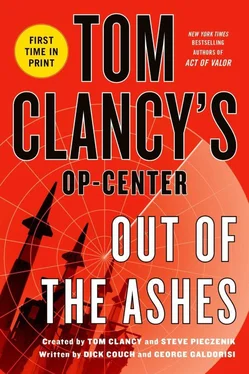“All right, I may not have, but my point, gentlemen, is as the president’s national security advisor, I and my staff have the primary responsibility to advise the president on all matters impacting the security of our nation. While the president will always have the final call, I would hope we use Op-Center only in those special circumstances where it’s specifically appropriate, within its charter. I would hope you don’t have in mind that Op-Center would be the first responder every time there’s a national crisis.”
The president didn’t mind his national security advisor standing his ground, but he didn’t want this to start out as an adversarial relationship.
“Trevor,” Midkiff said, “you know we’ll be mindful of that. I’m certain the admiral’s thirty-five years of military service have left him with a well-nuanced view of when the normal levers of national power are sufficient and when we need to turn to Op-Center in a crunch. Admiral?”
“You are both right, Mr. President. I think we all recognize and respect Mr. Harward’s position as your primary advisor on all national security matters. I agree with him and believe we all view a reconstituted Op-Center as an instrument you would use only when the situation called for it.” Williams paused for a long moment, and then continued. “So I’ll say this carefully, Mr. President, and forgive me for being so blunt, but if I take this assignment, I work for you, period. I respect your position as national security advisor, Mr. Harward, but if I think there is an issue for the president’s attention and his attention alone, I will make that known to him — directly, and only to him.”
Trevor Harward, normally quite good at concealing his emotions, was visibly taken aback. He had not expected this. He sat forward, clearly taking issue with what Williams was proposing.
“Mr. President,” Williams continued, “if you wish to put the national security advisor in the picture, I will accept that, but I want to make it crystal clear that I won’t work through Mr. Harward. I have no issue in working with him, but only at your direction.”
There was an uncomfortable silence, and Wyatt Midkiff knew he was the only one who could break it.
“Yes, well, I think that captures it appropriately, Admiral. I would expect you to come directly to me, and I’ll make the call when Mr. Harward and his capable staff need to become involved.” The president knew his national security advisor’s feathers were ruffled, but at the same time he was becoming increasingly comfortable with Williams. “Gentlemen, as you suggested earlier, Admiral Williams and I need to spend a few moments one-on-one while I consider him for this assignment. Let’s table this, and other agency relationships, until the two of us have had a chance to talk.”
“Yes, Mr. President,” Harward and Hood said nearly simultaneously as they rose and left the Oval Office.
* * *
The president waited several moments after the door to the Oval Office closed. Wyatt Midkiff’s initial assessment of Chase Williams had left him with a positive impression. Now it was time to dig deeper.
“Admiral, well, here we are, alone at last. A meeting I didn’t anticipate but one you clearly did. I must confess I feel you have me at a disadvantage.”
“I assure you, Mr. President, I didn’t come in here with an elaborate pitch for why you should select me to lead Op-Center. I came here to listen. I’m sure you have a long list of exceptionally well-qualified candidates who could serve in this capacity.”
“Perhaps so, but none of them have Paul Hood’s recommendation. Paul’s not a politician; he’s a patriot. He says the same of you. Tell me, Admiral, have you and Paul known each other professionally?”
“No, Mr. President. I was aware of Mr. Hood’s service as Op-Center director years ago when I was serving on the National Security Staff as a Navy captain. But I was pretty far down the food chain then, so we had no direct interaction.”
“I see. So because you’ve served on the National Security Staff before, I’m sure you appreciate Mr. Harward’s position.”
“I do, Mr. President. For my money, he’s got one of the toughest jobs in government, especially during these challenging times.”
The conversation continued for forty-five minutes, the two men measuring each other, discussing national security, sharing ideas regarding what Op-Center should look like, and when it should and should not be called into action. They talked about issues from staff size to possible locations for Op-Center to relationships with the rest of the executive branch. They also were in general agreement Op-Center’s initial focus should be to deal with international crises, nipping potential attacks on the United States far from America’s shores.
The president wanted to know more about Williams’s background and he learned a great deal. Chase Williams was a military brat, the son of a career Marine Corps officer and a schoolteacher. He was a middle child with one older brother and one younger sister. He chose the Naval Academy and graduated third in his class. His class standing afforded him immediate graduate-education opportunities, but he turned them down. Instead, he chose to go directly to sea duty because, for Williams, going to sea and leading sailors on a Navy destroyer was the purest form of naval service. More than that, he understood the privilege of service; this was where he felt he could serve best. He loved his nation, his Navy, and his enlisted sailors. Those priorities guided him as a young ensign and as a four-star admiral.
Their discussion ranged from the professional into the personal. Though Williams was a widower, he and Midkiff both were grounded in traditional marriage, had grown children, and relished the prospect of grandchildren. Neither played golf, and both were voracious readers of historical biography.
The longer the conversation went, the more Wyatt Midkiff came to recognize the qualities Chase Williams brought to the table and could bring to Op-Center. Yet while the conversation was amiable and professional, the two men had not addressed some thorny and difficult questions.
“Admiral, I understand that you crossed swords with my predecessor while you were at Central Command. I know the barest outlines of that incident. Is there anything more you’d like to add?”
“What happened is a matter of record, Mr. President. I was given what I judged to be an unlawful order. I refused to carry it out. That’s part of my officer’s oath.”
“Your officer’s oath?”
“Yes, Mr. President. As you probably remember from your naval service, when enlisted men or women join our military, reenlist, or get promoted, they take an oath, part of which includes ‘and obey the orders of the president of the United States and the officers appointed over me.’”
“Yes, well, that sounds reasonable,” Midkiff replied, doing nothing more than trying to be an active listener.
“It does, Mr. President. However, as you also likely recall, the officers’ oath contains no such language, only that the officer will ‘support and defend the Constitution of the United States.’”
“And I suspect you’re going to tell me why, Admiral.”
“Two words, Mr. President. My Lai. Vietnam in 1968. Soldiers of Charlie Company murdered more than three hundred Vietnamese villagers. Their company commander was Captain William Calley. At his trial, Calley’s defense was he was just following orders.”
“Yes, Admiral, I’m aware of that history. And so you refused to follow your president’s orders?”
“I did.”
“In hindsight, was there anything either of you could have done to defuse that situation? I’m asking not out of curiosity, but just to be sure we begin our relationship on the right foot.”
Читать дальше












